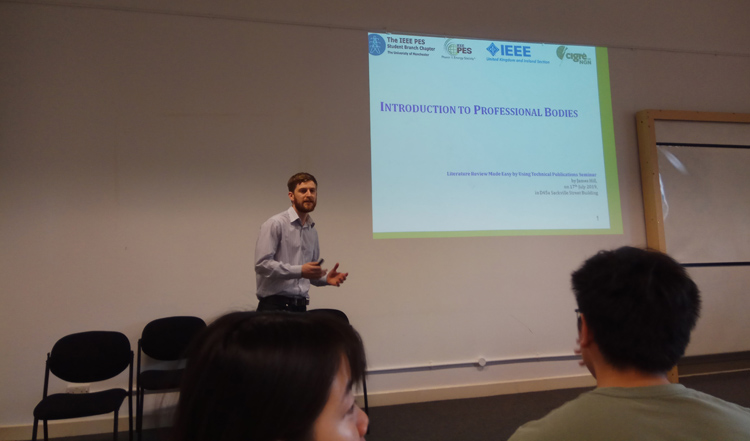PES Student Branch Chapter’s Corner: Updates from the University of Manchester
On Wednesday 17th July 2019, the IEEE Student Branch UoM and CIGRE-UK NGN co-hosted an event at The University of Manchester. The event attracted 24 attendees, mostly new MSc and first-year PhD students at UoM. The event had two primary aims: to increase awareness of IEEE Student Branches / Chapters and CIGRE NGN; and bring attention to the types of resourcesuseful to young researchers produced by the IEEE and CIGRE. The Student Branch Chapter also organised a site visit to Siemens Digital Factory in Congleton, UK. Detail descriptions of the events are provided here.
The first technical event offered three talks. The first was delivered by James Hill, the CIGRE-UK NGN Institutions Collaborations Lead and Past-Chair of the IEEE PES Student Branch Chapter at UoM. His talk introduced the two institutions of IEEE and CIGRE, explained which publications are available from them, and how to be involved and get the most from the Student / NGN societies.

After this introduction, Prof. Paul Jarman explained how research can actively influence the direction that standards take, and conversely, how standards can help to influence and direct our research. Prof. Jarman drew on his vast experience from involvement with standards related to transformers to explain the process required for their establishment and revision.

Finally, Dr. Mathaios Panteli presented on his experience as a young researcher involved in a CIGRE working group during his PhD. He highlighted how beneficial this was to his career and how ideas he got from conversing with the senior personnel he was exposed to in this environment helped to add significant value to his final thesis.

The event was well received, with feedback from attendees enjoying the open discussion; personal anecdotes providing context to these concepts, and some key tips for assisting with literature reviews and forging of research directions were picked up by all. Tea, coffee and biscuits were available which allowed for networking between attendees and presenters before and after the workshop. For anyone who missed out on the event, slides can be found online.
The technical Visit to Siemens Digital Factory in Congleton, UK attracted 28 attendees across PhD and MSc students in School of Electrical and Electronic Engineering. The visit was FREE with transportation included.
Siemens’ Digital Factory designs and manufactures variable speed drives for motors. Its customers come mainly from the automotive sector, machine building (OEMs), pumps and fans and the airport industry. The plant is at the cutting edge of Siemens’ unique ‘North Star’ vision and uses virtual technology, including a futuristic 3D cave, to stand out as one of the true pioneers of factory design today.
The visit was split into three parts. The first part began with Mr Ian Baron, the Electrical Team Manager, giving a brief introduction of the Congleton site. Then, three representatives for the Gradate Development Programme and Internship Programme of Siemens shared their own experiences working in the company, highlighting their great experiences of working with real products and solving practical problems for the customers.

Mr. Baron giving an introduction
The presentations were followed by an interactive “Show & Tell” session where three sample motor drive products and a number of tool kits were provided to the visitors. The Siemens representatives helped the visitors dissembled the motor drives and introduced the functionalities of each part. Many questions were asked and answered with knowledge being exchanged.

Siemens representative Mr. Matt Greenhalgh explaining the structure of a motor drive
During the third part, the visitors were divided into two groups taking turns to visit the Research & Development Facility and the motor drive factory. In the “G Building” where the R&D takes place, staff of Siemens showed and explained different sections of test facilities to the visitors. During the tour to the factory, the visitors were showed with the entire manufacture line of a motor drive, from soldering electronic components to a printed circuit board, to function testing of the board and the final products. Siemens kindly provided all the personal protective equipment required to enter the manufacturing area.

Tour in the “G Building”, one participant asking a question
This event was well received with highly positive feedback from the participants. The IEEE PES SBC at the University would like to thank every participant for joining the visit and many thanks again to Siemens, Congleton for the visit and all the useful information provided!

Mingyu Han
Chair, IEEE PES Student Branch Chapter at The University of Manchester
PhD Researcher, EPSRC Centre for Doctoral Training in Power Networks
University of Manchester
